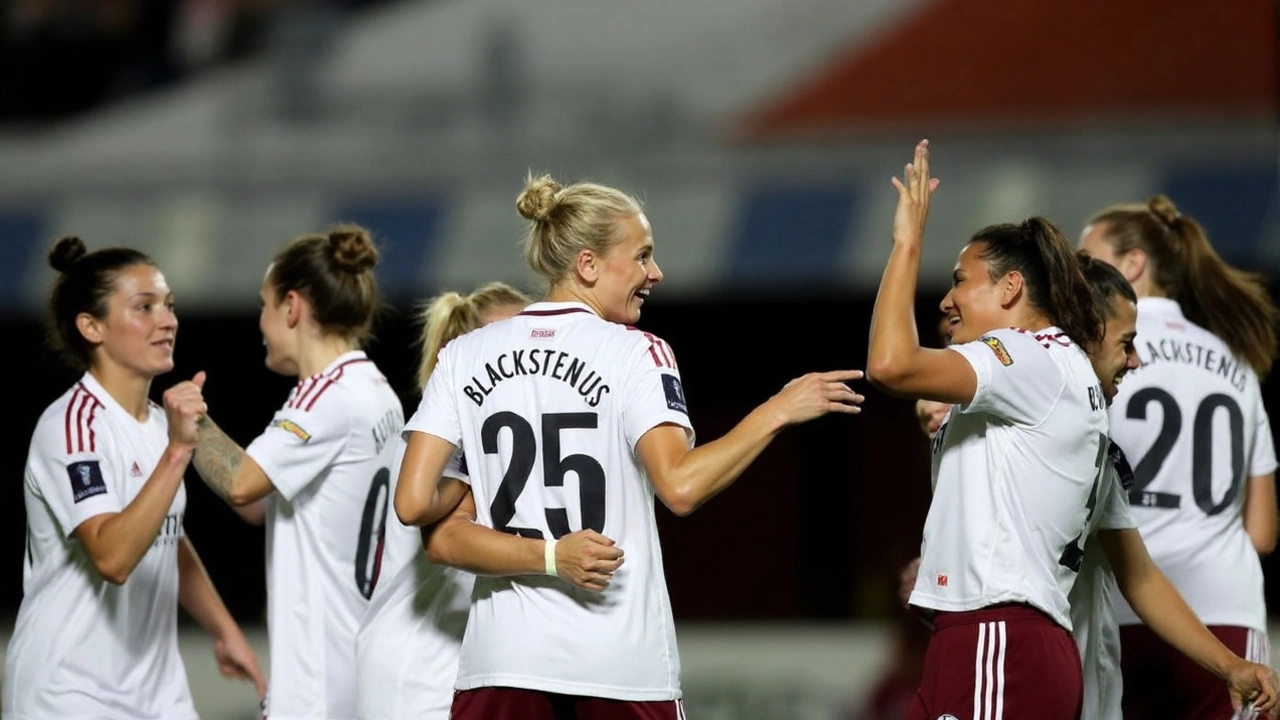Arsenal turn an early scare into a statement win
Two games, two comebacks shaped the latest weekend in the WSL. Arsenal didn’t just survive an early jolt at West Ham—they tore through it. Down inside five minutes after a ricochet off goalkeeper Daphne van Domselaar from Shekiera Martinez’s driven cross, the league leaders answered with calm, then crushed the match with pace and precision.
The equaliser set the tone. Frida Maanum timed her run perfectly and finished cleanly after Beth Mead slipped a pass through the legs of Oona Siren, a neat little nutmeg that flattened West Ham’s defensive shape. From there, Arsenal controlled the rhythm. They moved the ball side to side, pulled markers out of lanes, and waited for the gaps that always come when a home side spends too long defending its own box.
After the break, the visitors went up a gear. Stina Blackstenius put Arsenal in front on 52 minutes, a classic poacher’s finish from close range, made beautiful by Alessia Russo’s backheel that carved open the six-yard area. It was the kind of assist that says as much about awareness as it does about flair—Russo knew exactly where the danger was behind her.
Ten minutes later, Caitlin Foord made it three with a header from Mariona Caldentey’s cross, a goal that rewarded Arsenal’s repeated tries to isolate wide areas and attack the far post. West Ham’s back line had to choose: protect the cut-back to the penalty spot or defend the aerial threat at the back stick. They chose the former. Foord punished the latter.
Russo then took the spotlight. In the 89th minute she stepped onto a loose ball at the edge of the box and ripped it into the top-right corner, the sort of strike that removes all doubt and drains whatever hope the opposition still had. Deep into added time she tucked away a penalty to seal her brace and the points, a cool finish after a confident run-up.
Arsenal’s 5-1 says two things. First, their front line is balanced: Russo’s link play, Blackstenius’s penalty-box instincts, Mead’s service, Caldentey’s craft, and Foord’s aerial threat give them multiple routes to goal. Second, the midfield knows how to set the tempo. Maanum’s timing between the lines, plus the team’s patience in possession, kept West Ham chasing shadows for long spells.
There’s also resilience in the way they responded to the opening setback. Conceding on a fluke can rattle a team. Arsenal treated it like a hiccup. They kept their structure, didn’t force passes, and waited for the right moments to inject speed. That’s a sign of a side that trusts its plan and each other.
What does it mean for the table? Arsenal stay perfect and climb to the top with maximum points. The goal difference bump won’t hurt, either. Early days, sure, but performances like this build more than numbers. They build belief. When your forwards are scoring in different ways and your midfield is pulling strings, the travel home feels lighter and the next match looks less like a hurdle and more like a runway.
- West Ham 1-5 Arsenal
- 5’ West Ham lead via own goal (van Domselaar) from Martinez’s cross
- 21’ Maanum levels after Mead’s nutmeg pass through Siren
- 52’ Blackstenius makes it 2-1 from Russo’s backheel
- 62’ Foord heads in Caldentey’s cross
- 89’ Russo curls into the top-right corner
- 90+’ Russo adds a penalty for her brace
Big picture, Arsenal’s attack looks layered rather than dependent on one player. Even with Russo’s brace, the damage was spread around, and the assist patterns—Mead to Maanum, Caldentey to Foord, Russo to Blackstenius—tell a story about a team where anyone can be the creator or the finisher. That’s the sort of balance that survives injuries, fixture congestion, and tricky away days.
Man City finally spark into life after a slow start
Across the country, Manchester City had their own nerve check. Brighton arrived in good shape and landed the first punch when Fran Kirby struck on 14 minutes. The visitors looked confident, used the ball well, and were the better side for chunks of the first half.
City, though, didn’t fold. At home, with pressure building after a sluggish opening to the season, they found enough control to turn the game. The adjustments were simple: push the full-backs higher to pin Brighton’s wide players, get midfielders breaking lines off the ball, and be braver playing through pressure rather than around it. The result was territory, second balls, and chances—exactly what they were missing in earlier matches.
Two second-half goals flipped the scoreboard and the mood. The equaliser steadied the team; the winner released the tension. It wasn’t flashy, it was driven—chasing runners into the box, attacking cut-backs, and staying alert on rebounds. You could see the urgency in the way they flooded the penalty area when crosses came in. That’s often the difference between a shot and a goal.
For Brighton, there were real positives. Kirby’s early finish underlined her instinct and the chemistry building in their front line. Their first-half composure earned them time and territory, and on another day they might have nicked a second before the interval. The lesson will sting: in this league, it only takes five panicky minutes to undo 45 good ones.
City’s 2-1 matters for more than the three points. It breaks the spell of a winless start and gives the squad a reference game: fall behind, stay calm, turn it. That kind of muscle memory matters in autumn when the table is tight and every club is still figuring itself out. It also gives their next opponents video clips to worry about—runners from deep, bodies in the box, pressure on second balls.
Put both results together and you get a theme: resolve. Arsenal turned a messy start into a rout. City took a punch and answered without losing shape. Those habits—keeping the ball when the crowd gets nervous, choosing the safer pass when the high-risk one is tempting, trusting that the chance will come—often separate contenders from chasers by winter.
There’s more to come, of course. Fixtures will stack up, and rotations will test depth. The teams that thrive will be the ones that can win in different ways: by blowing doors off, like Arsenal did, and by grinding out points after a scare, like City managed. For now, the table reflects it—Arsenal on top with momentum to burn, City finally moving and looking more like themselves.

